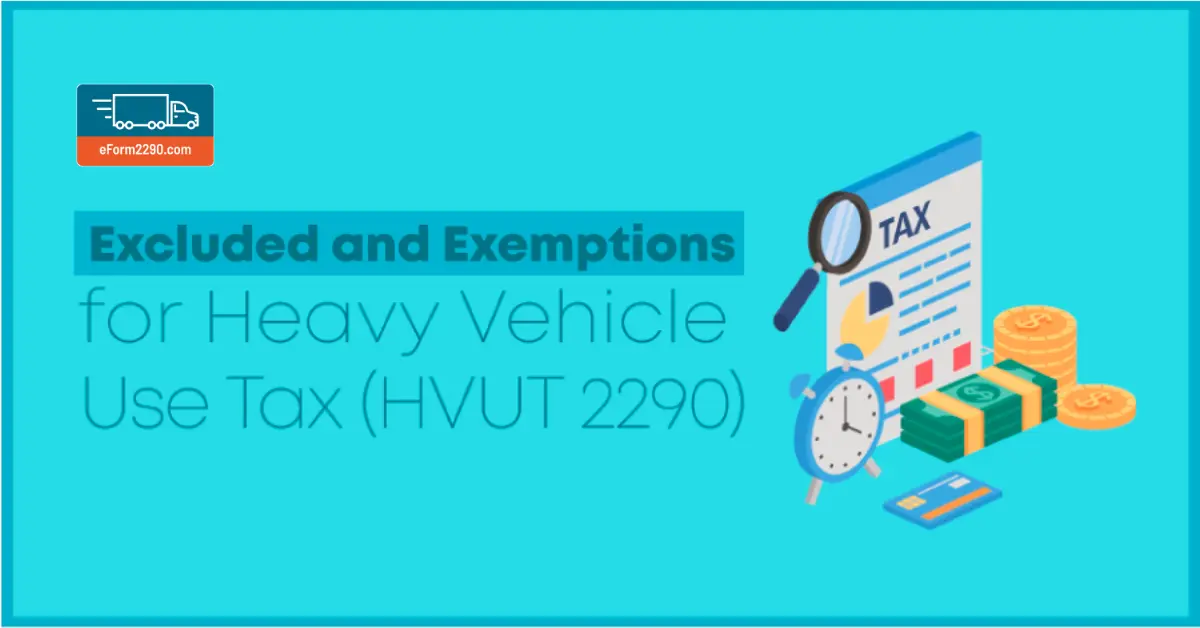Excluded and Exemptions for Heavy Vehicle Use Tax (HVUT 2290)

Are you a trucking professional in the U.S.? If so, you're probably well-acquainted with the Heavy Vehicle Use Tax. While IRS HVUT Form 2290 is mandatory for Heavy Vehicles using federal highways, there are several vehicles that are exempted from Form 2290 filing. With this blog, we will walk you through some of the common cases for HVUT 2290 exemption. Let’s dive into the topic further and try to understand each of these exemptions in detail.
Common Exclusions for HVUT Form 2290
1. Exemption for Government Vehicles
As per the IRS regulations, the use of a highway motor vehicle is exempt from the HVUT if it is used and actually operated by:
- The Federal Government
- The District of Columbia
- A State or Local Government
This exemption recognizes the essential roles played by government entities in maintaining public services and infrastructure. It's important to note that this HVUT 2290 exemption doesn't cover government vehicles used for non-governmental purposes and proper documentation may be required to substantiate eligibility.


2. Exemption for Nonprofit Organizations
Nonprofit organizations that provide critical services to communities can also benefit from HVUT exemptions. This includes vehicles operated by:
- The American National Red Cross
- Nonprofit Volunteer Fire Departments
- Ambulance Associations
- Rescue Squads
These organizations often rely on vehicles for emergency response and humanitarian efforts. To qualify for this exemption, the vehicles must be used exclusively for nonprofit activities.
3. Indian Tribal Governments
Indian tribal governments can claim HVUT 2290 exemption if the vehicle's use involves the exercise of an essential tribal government function. This recognition acknowledges the unique governance structures and needs of tribal communities.
4. Mass Transportation Authorities
Mass transportation authorities created under statutes that grant them certain powers typically exercised by the state may also be exempt from IRS HVUT Form 2290. These authorities play a vital role in public transportation and urban mobility.
Special Exemptions
1. Qualified Blood Collector Vehicles
The IRS guidelines reaffirm that qualified blood collector vehicles used by qualified blood collector organizations are exempt from IRS HVUT Form 2290. To qualify for this exemption:
At least 80% of the vehicle's use during the prior tax period must have been by a qualified blood collector organization for the collection, storage, or transportation of blood.
A vehicle first placed in service in a tax period can be treated as a qualified blood collector vehicle if the organization certifies that at least 80% of its use during the tax period will be for these critical purposes.
This exemption acknowledges the life-saving work of blood collector organizations and supports their mission.
2. Mobile Machinery for Non-Transportation Functions
IRS guidelines clearly define what qualifies as mobile machinery for non-transportation functions. To be considered for HVUT 2290 exemption, a vehicle must meet the following criteria:
- The chassis must have machinery or equipment permanently mounted on it, used for specific non-transportation operations, such as construction, manufacturing, drilling, mining, timbering, processing, or farming.
- The chassis must be specially designed solely as a mobile carriage and mount (and power source, if applicable) for the machinery or equipment, regardless of whether the machinery or equipment is in operation.
- The chassis, due to its special design, cannot be used as part of a vehicle designed to carry any other load without substantial structural modification.


This exemption aims to support industries that rely on specialized machinery not intended for highway transportation.
- Vehicles Not Considered Highway Motor Vehicles
- Vehicles Specially Designed for Off-Highway Transportation
The IRS also provides clarification regarding vehicles that are not considered highway motor vehicles. If a vehicle is specially designed for the primary function of transporting a particular type of load other than over the public highway, and its capability to transport a load over a public highway is substantially limited or impaired due to this special design, it may not be treated as a highway vehicle.
To determine whether a vehicle falls under this category, factors such as the vehicle's size, licensing requirements, safety regulations, and sustained highway speed (at least 25 miles per hour) are considered. It's essential to note that the vehicle's ability to carry heavier loads off the highway does not impact this determination.
3. Tax Credits and Refunds for Exempt Vehicles
While exempt vehicles generally do not owe HVUT, specific circumstances may lead to tax credits or refunds. For instance, if a vehicle transitions from exempt to taxable status during a tax period, a prorated tax amount may be due. Similarly, if you've overpaid HVUT due to past filing errors, you may be eligible for a refund.
The process for claiming these credits or refunds can be intricate, so consulting tax professionals or the IRS directly is recommended.
4. State-Specific Exemptions
In addition to federal IRS HVUT Form 2290 rules, it's crucial to be aware of state-specific exemptions or regulations that may apply. States may have their own tax laws and exemptions, which can further impact your tax obligations. Trucking professionals should consult state-specific resources or regulatory authorities to ensure full compliance.
We hope this comprehensive blog has provided you with helpful information on HVUT 2290. Compliance with tax regulations is essential, and seeking professional guidance when needed is a good idea. For further assistance and to file your IRS HVUT Form 2290, visit the eForm2290, where you'll find resources and support to navigate the road ahead confidently.

